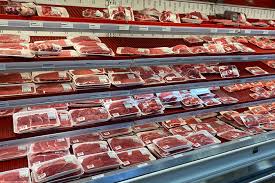LINCOLN, Neb. (DTN) -- USDA on Thursday announced a series of loan guarantees and grants to expand meat production capacity across the country in the latest of several steps by the Biden administration to grow small-scale processing following the supply chain problems during the COVID-19 economic shutdown.
The agency awarded $3.9 million in 23 Value-Added Producer Grants to help producer-owned companies process and market new products.
In addition, USDA is providing $5.7 million in loan guarantees for two companies through the Food Supply Chain Guaranteed Loan Program. The program is designed to grow infrastructure for food aggregation, processing, manufacturing, storage, transportation, wholesaling and distribution.
U.S. Agriculture Secretary Tom Vilsack said during a press call on Thursday he expects USDA will be making similar announcements within the next couple of months.
"The point of this is that we're looking at a creative, comprehensive set of opportunities to expand more new and better market opportunities for meat and poultry," Vilsack said.
"We're going to continue to do this over the course of the next several months. As we utilize American Rescue Plan resources, we also expect at some point in time coming here in 2023 to also have a companion program that will focus on non-meat and poultry processing. So, it is an opportunity for us to continue to look for ways to help small- and mid-sized family operations to have additional market opportunities that will create hopefully more income for farmers, more choice for consumers and more jobs in rural areas."
In all, the new $9.6 million funding announcement centers on 25 projects in California, Illinois, Iowa, Kansas, Kentucky, Maine, Montana, Nebraska, New York, Ohio, Oklahoma, Texas, Virginia, Washington and Wisconsin.
The largest recipient of USDA dollars was Amarillo, Texas-based Bottomland Prime LLC to expand Edes Custom Meats, which is a cattle meat-processing and retail outlet.
According to USDA, Bottomland Prime expects its business to include custom USDA-inspected processing for local producers and specialty markets, as well as local retail sales of beef cuts, sausage, jerky, pork and lamb. In addition, the loan is expected to help expand the business' wholesale markets through different convenience stores and cold-storage services.
Some of the USDA funds are being invested in areas of the country that may not have an abundance of meat-processing capacity.
In Montana, for example, there is little or no slaughter capacity.
Vilsack said it will take time for many regions to reap the rewards of expanding processing.
"The key here is that we are constantly looking for ways in which farmers can figure out new approaches to improve income, especially for small- and mid-sized producers," he said.
"There are several strategies. One strategy is by adding value to whatever it is they're producing. If you have a value-added producer grant, you're essentially in a position to take something that would otherwise be sold as a commodity, you're processing it, you're adding value to it right on the farm. You're creating that opportunity for additional income so that farmers not only benefit from production, but also processing."
Vilsack said another way to approach it is by expanding the processing capacity within a region or area. "So the farmers have more than one market opportunity in which to potentially sell their livestock with one or more than one market opportunity."
USDA announced on Feb. 24, 2022, a $150 million grant program to expand meat-processing capacity across the country through the Meat and Poultry Processing Expansion Program. The application deadline for that program was on May 11, 2022.
In 2021, USDA awarded more than $32 million to 167 businesses to help expand meat and poultry slaughter and processing.
USDA's Agricultural Marketing Service already has awarded $54.6 million to 278 businesses and individuals through the Meat and Poultry Inspection Readiness Grant Program for strengthening and developing new markets for U.S. meat and poultry processors, according to USDA.
AMS also invested up to $25 million to establish the Meat and Poultry Processing Capacity Technical Assistance Program, which provides technical assistance to producers.














